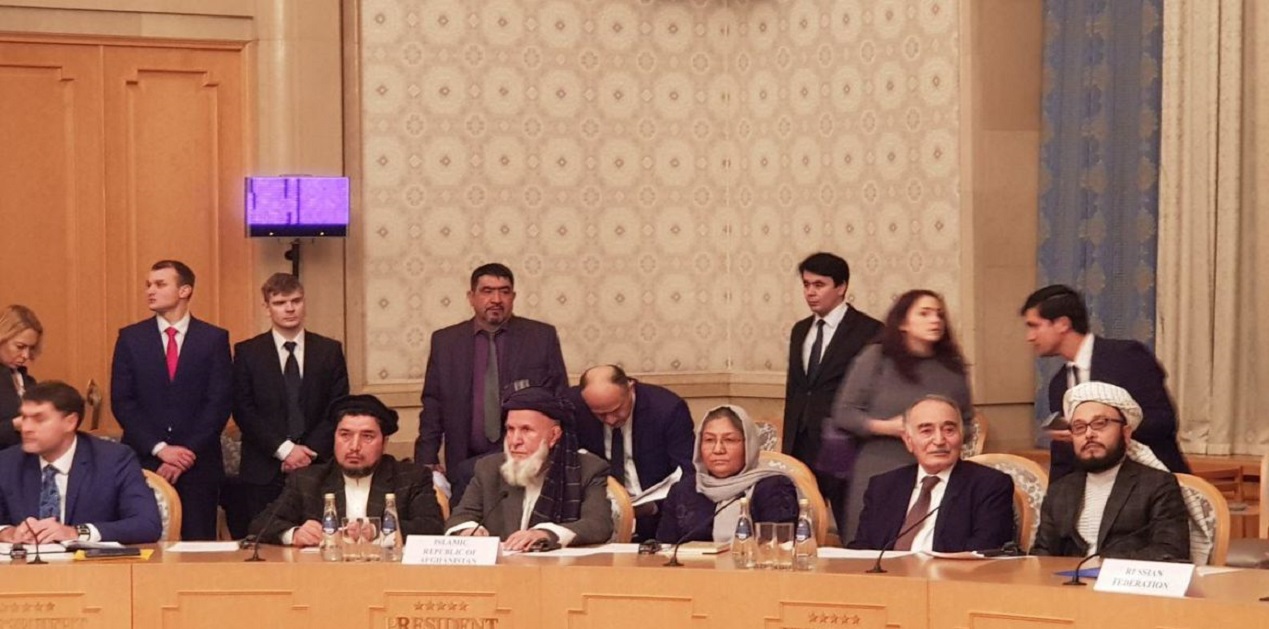Introduction
The intra-Afghan dialogue convened with the joint efforts of Germany and Qatar from 7-8 July in Doha has raised hopes of ending the 18-year-old conflict in Afghanistan. The dialogue was celebrated as a major milestone by all the major players including the US, Russia, Germany, as well as the people of Afghanistan, and Ghani government.1 It is largely seen as a stepping stone towards a more formal dialogue between the Taliban and the Afghan government in the future. However, a closer look at the recently concluded intra-Afghan dialogue suggests that the road to peace is still long and tough in Afghanistan.
In what could prove to be a damaging move to peace talks, in the long run, the intra-Afghan dialogue completely failed to address potentially deal-breaking issues such as the upcoming Presidential elections, and the presence of terrorist groups in Afghanistan. Moreover, it also failed to deliver on a long pending demand of Afghan people; Ghani government; and the international community of bringing a ceasefire into force in the country.2
The intra-Afghan dialogue was attended by 17 representatives of the Taliban and 50 delegates from Afghanistan. Since the Taliban is still adamant of not conducting direct negotiations with the Ghani government, the Afghan delegates attended the talks in their personal capacity and were not officially representing the government of Afghanistan.3 They represented a broad section of Afghan people including ethnic and religious minorities like Anarkali Honaryar, a Punjabi Sikh Afghan politician, 10 female delegates, members of civil society, youth, journalists, and political elites.4 The major issues which were discussed during the course of two days included women’s rights, civilian protection, ceasefire, foreign forces withdrawal, and post- peace deal government. At the end of the dialogue, a non-binding joint resolution was issued which was drafted by a committee consisting of 6 members from Afghan delegation and 3 members from the Taliban. It was headed by Habiba Sarabi, a female delegate and Deputy Chair of Afghan High Peace Council.5
Issue of Civilian Casualties and Ceasefire
The major success of intra-Afghan dialogue is the joint resolution issued by both the sides which called for an urgent need to reduce the civilian casualties to zero. It also emphasized the need to ensure “safety of public institutions including schools, madrasas, hospitals, markets, water dams, and workplaces.”6 The declaration certainly raised hopes in all the sections of Afghan society, government and international community, however, it is important to understand that since the beginning of talks in 2018, the Taliban has used the strategy of increasing the violent attacks while negotiating in order to gain more bargaining power with its adversaries at the peace talks. In fact, the intra-Afghan dialogue at Doha also took place in the background of two gruesome attacks by the Taliban in Kabul and Ghazni which left many civilians dead and several school children wounded. 7
In 2018, the UN Report on Afghanistan claimed that “28% of all civilian casualties were children, a total of 927 deaths and 2,135 injuries. There were 18 attacks on educational facilities in the first three months of 2019. Staggering conflict-related child death in Afghanistan is the result of explosive weapons.”8 Further, in 2018, the attack against schools in Afghanistan has increased three-fold from 68 in 2017 to 192 in 2018.9UNICEF chief Henrietta Fore recently stated that “education is under fire in Afghanistan. The senseless attacks on schools, the killing, injury, and abduction of teachers, and the threats against education are destroying the hopes and dreams of an entire generation of children.” 10
The Taliban has continuously refused the demand for a ceasefire from the Afghan society, Ghani government, and the international community. There is a huge possibility that the Taliban leadership is under immense pressure from their military commanders not to agree to a ceasefire before achieving a favorable and tangible outcome. Therefore, before proceeding further, there is a need to establish the sincerity of the Taliban’s claims of bringing down the violence in the country and its respect for the public institutions. It is equally important that instead of completely appeasing the Taliban, the international community should adopt a carrot and stick policy with the armed group to ensure a successful outcome.
Issue of Upcoming Presidential Elections
Another potentially deal-breaking issue which both the sides completely neglected during the intra-Afghan talks is the upcoming Presidential elections in Afghanistan. President Ghani has recently stated that after being postponed twice, the Presidential elections in Afghanistan will be held on 28 September 2019 without any further delay.11 In its bid to prepare for the upcoming Presidential elections, Independent Election Commission of Afghanistan (IEC) has already started reforming the voter's list, allocated $ 30 million for the purchase of biometric devices, registered over 9 million Afghans for the vote, and appointed 11 new provincial chiefs of the commission.12 The IEC has pegged the estimated budget for the Presidential elections at $149 million out of which $90 million will be paid by the Afghan Government, and the rest will be provided by the international community.13 Earlier, the IEC had approved the nomination of 18 candidates for the upcoming Presidential elections including the incumbent President Ashraf Ghani, Chief Executive Abdullah Abdullah, and former National Security Advisor Hanif Atmar, among others.
The US Secretary of State Mike Pompeo during his visit to Afghanistan in June 2019 indicated that the US wants to achieve a peace deal with the Taliban before September 1, 2019.14 However, achieving a peace deal before the Presidential elections will open up Pandora’s Box in Afghanistan. The Taliban has repeatedly shown its disapproval towards electoral processes in the country including the upcoming Presidential elections. The Taliban has also refused to accept the constitution of Afghanistan on the pretext that it’s imposed from the western powers. The intra-Afghan dialogue in Doha also failed to bring a consensus on what form of government Afghanistan is going to have in the future. The Taliban insists on establishing an Islamic emirate and dismantling the present republican democratic order. Achieving a peace deal before Presidential elections would mean resolving all these contentious issues. Without a clear roadmap for the Presidential elections and the peace deal, the country might plunge into more chaos. At present, when the US is conducting negotiations with the Taliban, it is extremely crucial that Presidential elections in Afghanistan are not postponed or cancelled under any pretext, since only free and fair Presidential elections can establish the required legitimacy of the democratic political structure in the country.
Terrorist Groups Present in Afghanistan
One of the major guarantees which the US is demanding from the Taliban is that it will not allow the terrorist groups to use the Afghan territory to launch attacks outside the country. It is a major concern for the political elites in Afghanistan, regional countries, as well as the international community since it was the Taliban’s harboring of Al-Qaida in Afghanistan’s territories which brought the US to its doorstep in 2001. However, even after the seven rounds of talks with the US, the UN Security Council report suggests that the Taliban “continue to be the primary partner for all foreign terrorist groups, with the exception of Islamic State, operating in Afghanistan”, and that “Al-Qaida has grown stronger operating under the Taliban umbrella across Afghanistan and is more active than in recent years and has been intensifying its concentration in the Afghan-Pakistan border area in close cooperation with Lashkar-e-Tayyiba and the Haqqani Network. Al-Qaida members act as instructors and religious teachers for Taliban personnel and their family members.”15
The special US representative for Afghan peace and reconciliation, Zalmay Khalilzad, has described the latest round of US-Taliban talks as “the most productive” in which “a lot of progress” has been achieved.16 However, if the Taliban, after seven rounds of peace talks with the US, is still collaborating with the terrorist groups like Al-Qaida then it raises some serious questions about the US-led peace initiative and what exactly it aims to achieve in Afghanistan. At the same time, it also reveals the duplicity of the claims made by the Taliban about moderating itself as the nationalist force. Any hasty peace deal in Afghanistan which doesn’t incorporate these concerns will prove more damaging to the US interests as well to the security of the regional countries.
Conclusion
The dialogue between the Taliban and the Afghan delegation in Doha has definitely raised hopes that it might lead to formal negotiations between the armed group and the Ghani Government. Also, the dialogue resulted in some trust-building measures like the unconditional release of elders, disabled and ill inmates.17 In addition, the Taliban reiterated its respect for women’s rights in political, social, economic, educational, and cultural areas, however, within the framework provided by Islam. 18 These are undoubtedly important achievements in the peace process. However, what is critical at the moment is to gauge the progress in the peace talks on the basis of practical actions so as to avoid any future stumbling blocks. Taliban’s insistence on keeping important issues such as women’s rights, human rights, media freedom, freedom of expression and speech within Islamic laws and principles raises the fear that the armed group might use it as a leverage to restrict freedom in the future. Moreover, till now the Taliban has not provided any practical demonstration of its changed worldview or behavior. On the contrary, the Taliban recently threatened the media houses in Afghanistan from publishing anything that it considers as “propaganda” against itself. 19
The domestic political compulsion of President Trump in the background of lack of political support for the Afghan War has convinced the armed group that it can set the terms of engagement with the US. Therefore, without giving any real commitment on issues such as giving up its support to terrorist groups, women rights, human rights, accepting ceasefire and the Afghan constitution, the Taliban has gained certain international legitimacy and every major power such as the US, China, Russia, and regional countries like Iran are negotiating with it. Finally, since the Taliban is not a monolithic group, therefore, what could really jeopardize the whole peace process is the inability of the Taliban leadership to convince all its factions to accept the peace deal offered by the US. What is crucial at the moment is to stop appeasing the Taliban and seek certain hard evidence from it for its moderated stance before bestowing it with more international legitimacy.
References
- Russia Supports Results Of Intra-Afghan Talks In Doha, TOLO News, 10 July 2019, URL: https://www.tolonews.com/afghanistan/russia-supports-results-intra-afghan-talks-doha; Also see, Mujib Mashal, Afghan Peace Negotiations Show Signs of Progress, The New York Times, 6 July 2019, URL: https://www.nytimes.com/2019/07/06/world/asia/afghanistan-war-withdraw-american-troops-peace.html?module=inline ; Kabul Sees Qatar Dialogue As A Progress In Peace Process, TOLO News, 8 July 2019, URL: https://www.tolonews.com/afghanistan/kabul-sees-qatar-dialogue-progress-peace-process; Merkel Hails Recent Talks In Qatar On Afghan Peace, TOLO News, 10 July 2019, URL: https://www.tolonews.com/afghanistan/merkel-hails-recent-talks-qatar-afghan-peace
- Afghan Women Network calls on participants of Doha peace talks, specifically the Taliban Movement, to commit to an immediate ceasefire to show good will and commitment to peace in Afghanistan, Afghan Women’s Network, 8 July 2019, URL: http://awn-af.net/index.php/cms/press_detail/1532/12
- Thomas Ruttig, AAN Q&A: What came out of the Doha intra-Afghan conference?, Afghanistan Analysts Network, 11 July 2019, URL: https://www.afghanistan-analysts.org/aan-qa-what-came-out-of-the-doha-intra-afghan-conference/
- Ibid
- Ibid
- Mujib Mashal, Stressing War’s Toll, Taliban and Afghan Representatives Agree to Peace Road Map, The New York Times, 8 July 2019, URL: https://www.nytimes.com/2019/07/08/world/asia/afghanistan-taliban-peace-talks.html?rref=collection%2Ftimestopic%2FAfghanistan
- Taliban Bombing In Ghazni Leaves 12 Dead, TOLO News, 7 July 2019, URL: https://www.tolonews.com/afghanistan/car-bombing-reported-ghazni-casualties-feared; Also see, Fatima Faizi and Rod Nordland, A Taliban Attack on Children Causes Outrage, Everywhere but at Peace Talks, 2 July 2019, URL: https://www.nytimes.com/2019/07/02/world/asia/taliban-school-attack.html?rref=collection%2Ftimestopic%2FAfghanistan
- David Zucchino, Amid Afghan Peace Talks, U.N. Reports Record Civilian Deaths in 2018, The New York Times, 24 February 2019, URL: https://www.nytimes.com/2019/02/24/world/asia/afghanistan-civilian-casualties.html?module=inline
- In Afghanistan, attacks against schools have tripled in one year, UN News, 28 May 2019, URL: https://news.un.org/en/story/2019/05/1039321
- Afghanistan sees three-fold increase in attacks on schools in one year – UNICEF, Press Release, UNICEF, 27 May 2019, URL: https://www.unicef.org/press-releases/afghanistan-sees-three-fold-increase-attacks-schools-one-year-unicef
- Peace Should Be Inclusive: Ghani, TOLO News, 10 July 2019, URL: https://www.tolonews.com/afghanistan/peace-should-be-inclusive-ghani
- IEC Allocates $30M For Purchasing Biometric Devices, TOLO News, 18 June 2019, URL: https://www.tolonews.com/node/145866
- Nuristani Says Govt, Donors Have Assured To Fund Elections, TOLO News, 14 July 2019, URL: https://www.tolonews.com/elections-2019/nuristani-says-govt-donors-have-assured-fund-elections
- Pompeo Hopes There Is A Peace Deal Ahead Of Afghan Elections, TOLO News, 25 June 2019, URL: https://www.tolonews.com/afghanistan/pompeo-hopes-there-peace-deal-ahead-afghan-elections
- “Letter dated to 10 June 2019 from the Chair of the Security Council Committee established pursuant to resolution 1988 (2011) addressed to the President of the Security Council”, United Nations Security Council, 13 June 2019, URL: https://www.undocs.org/S/2019/481
- Zarif Nazar, U.S. Envoy Declares 'A Lot Of Progress' In Taliban Peace Talks, Radio Free Europe/Radio Liberty, 8 July 2019, URL: https://www.rferl.org/a/u-s-envoy-declares-a-lot-of-progress-in-taliban-peace-talks-/30043345.html
- Delegates Cautiously Optimistic On Future Of Talks With Taliban, TOLO News, 8 July 2019, URL: https://www.tolonews.com/afghanistan/delegates-cautiously-optimistic-future-talks-taliban
- Ibid
- Taliban threatens media in Afghanistan 'over enemy collusion', Al Jazeera, 24 June 2019, URL: https://www.aljazeera.com/news/2019/06/taliban-threatens-media-afghanistan-190624075013894.html
(The paper is the author’s individual scholastic articulation. The author certifies that the article/paper is original in content, unpublished and it has not been submitted for publication/web upload elsewhere, and that the facts and figures quoted are duly referenced, as needed, and are believed to be correct). (The paper does not necessarily represent the organisational stance... More >>
Image Source: https://thedefensepost.com/wp-content/uploads/2018/11/afghanistan-taliban-moscow-2-1170x610.jpg









.jpeg)
Post new comment